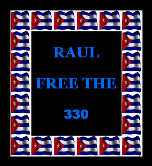
In commemoration of World Press Freedom Day, on May 3rd, Freedom House has released several critical tools to highlight data from its annual survey of global press freedom, and to help explain the newest findings in their historical context.
Here is Freedom House’s Draft Report for Freedom of the Press 2007 on Cuba:
Cuba
Status:NotFree
Legal
Environment: 30
Political Environment: 39
Economic Environment: 27
Total Score: 96
Cuba has the most restrictive laws on free speech and press freedom in the hemisphere. The constitution prohibits rivate ownership of media and allows free speech and press only if they “conform to the aims of a socialist society.” Cuba’s legal and institutional structures are firmly under the control of the executive. The country’s criminal code provides the legal basis for the repression of dissent, and under the guise of protecting state security, laws criminalizing “enemy propaganda” and the dissemination of “unauthorized news” are used to restrict freedom of speech. Insult laws carry penalties of three months to one year in prison, with sentences of up to three years if the president or members of the Council of State or National Assembly are the objects of criticism. The 1997 Law of National Dignity, which provides for jail sentences of 3 to 10 years for “anyone who, in a direct or indirect form, collaborates with the enemy’s media,” is aimed at the independent news agencies that send their material abroad.
The few journalists who do work for independent news agencies, write articles for foreign websites, or publish underground newsletters are routinely monitored, harassed, detained, interrogated, or imprisoned. At best they are accused of giving the Cuban revolution a “bad name,” at worst of working as counterrevolutionaries for the United States government or Cuban exiles. During the year, two journalists were released from prison, but two more were imprisoned, leaving a total of 24 journalists in long-term detention. One of those released, Lamasiel Gutierrez Romero, correspondent for the website Nueva Prensa Cubana, was freed on March 22 after serving a seven month sentence for “civil disobedience and resistance.” She returned to her home on the Isle of Youth under heavy police surveillance and was forbidden to leave the island. The two journalists who received lengthy prison sentences in 2006 were Armando Betancourt, a freelance journalist and editor of a small underground magazine, and Raymundo Perdigon Brito, who together with his sister had recently established a small news agency. At the beginning of August, six foreign journalists hoping to enter the country to cover reactions to the temporary transfer of power from President Fidel Castro to his brother, Raul, were interrogated by agents of the Interior Ministry and required to return to their country of departure. They were told that they did not have the work visa needed to practice journalism in Cuba.
The Communist Party controls all national media, including all print and electronic media outlets, apart from one or two unauthorized Catholic Church newsletters. Cubans do not have access to foreign media, although some international papers are for sale in hotels. The government continues to jam transmissions of the U.S. government–sponsored Radio and Television Marti. Although Telecommunications Minister Ignacio Gonzalez Planas has repeatedly stated that the internet is essential for the country’s development, the government does its best to restrict access, and less than 2 percent of the population was online in 2006. An investigation carried out by Reporters Sans Frontieres revealed that the government has banned most private internet connections and has installed software in all internet cafes and
leading hotels that triggers an alert message whenever ‘subversive’ keywords are entered. This strict control is backed by the threat of 5 years in prison for connecting to the internet illegally, and 20 years for writing “counter-revolutionary” articles for foreign websites.
Cuba, of course, does not observe World Press Freedom Day, they observe Propaganda day on May 1.







No comments:
Post a Comment